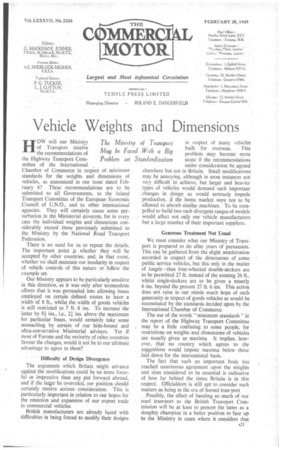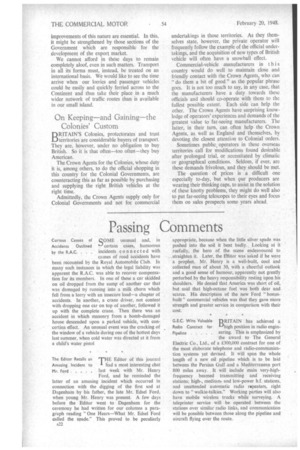Vehicle Weights and Dimensions
Page 23

Page 24

If you've noticed an error in this article please click here to report it so we can fix it.
OW will our Ministry of Transport receive the recommendations of the Highway Transport Committee of the International Chamber of Commerce in respect of , minimum standards for the weights and dimensions of vehicles, as announced in our issue dated February 6? These recommendations are to be submitted to all Governments, to the Inland Transport Committee of the European Economic Council of U.N.O., and to other international agencies. They will certainly cause• some perturbation in the Ministerial dovecots, for in every case the individual weights and dimensions considerably exceed those previously, submitted to the Ministry by the National Road Transport Federation.
There is no need for us to repeat the details. The important point js whether they will be accepted by other countries, and, in that event; whether we shall maintain our insularity in respect of vehicle controls of this nature or follow the example set.
Our Ministry appears to be particularly sensitive in this direction, as it was only after tremendous efforts that it was persuaded into allowing buses employed on certain defined routes to have a width of 8 ft.. whilst the width of goods vehicles is still restricted to 7 ft. 6 ins. To increase the latter by 81 ins., i.e., 2 ins, above the maximum for particular buses, would certainly take some stomaching by certain of our hide-bound and ultra-conservative Ministerial advisers. Yet if most of Europe and the rnaiority of other countries favour the changes, would it not be to our ultimate advantage to agree to them?
Difficulty of Design Divergence The arguments which Britain might advance against the modifications could be no more forceful or impressive than any put forward abroad, and if the lather be overruled, our position should certainly, receive serious consideration. This is particularly important in relation to our hopes for the retention and expansion of our export trade in commercial vehicles.
British manufacturers are already faced with difficulties in being forced to modify their designs in respect of many vehicles built for overseas. This problem may become more acute if the recommendations under consideration be agreed elsewhere but not in Britain. Small modifications may be annoying, although in most instances not very difficult to achieve, but larger and heavier types of vehicles would demand such important changes in design as would seriously impede production, if the home market were not to be allowed to absorb similar machines. To be compelled to build two such divergent ranges of models would affect not only our vehicle manufacturers but a large number of their important suppliers.
Generous Treatment Not Usual We must consider what our Ministry of Transport is prepared to do after years of persuasion. This can be gathered from the slight amelioration accorded in respect of the dimensions of some public service vehicles, but this only in the matter of length—thus four-wheeled double-deckers are to be permitted 27 ft. instead of the existing 26 ft., whilst single-deckers are to be given a miserly 6 ins, beyond the present 27 ft. 6 ins. This action does not raise in our minds much hope of such generosity in respect of goods vehicles as would be necessitated by the standards decided upon by the International Chamber of Commerce.
The use of the words "minimum standards" in the report of the Highway Transport Committee may be a little confusing to some people, for restrictions on weights and dimensions-of vehicles are usually given as maxima. It implies, however, that no country which agrees to the suggestions would impose maxima below those laid down for the international basis. , The fact that such an important body has reached unanimous agreement upon the weights and sizes considered to be essential is indicative of how far behind the times Britain is in this respect. Officialdom. is still apt to consider such matters as being in the era of horsed transport Possibly, the effect of handing so much of our road transport to. the British Transport Commission will be at least to present the latter as a doughty champion in a better position to face up to the Ministry in cases where it considers that improvements of this nature are essential. In this, it might be strengthened by those sections of the Government which are responsible for the development of the export market.
We cannot afford in these days to remain completely aloof, even in such matters. Transport in all its forms must, instead, be treated on an international basis. We would like to see the time arrive when our lorries and passenger vehicles could be easily and quickly ferried across to the Continent and thus take their place in a much wider network of traffic routes than is available in our small island.
On Keeping—and Gaining—the Colonies' Custom
BRITAIN'S Colonies, protectorates and trust territories are considerable buyers of transport. They are. however, under no obligation to buy British. So it is that often—too often—they buy American.
The Crown Agents for the Colonies, whose duty it is, among others, to do the official shopping in this country for the Colonial Governments, are counteracting this as far as possible by purchasing and supplying the right British vehicles at the right time.
Admittedly, the Crown Agents supply only for Colonial Governments and not for commercial undertakings in those territories. As they themselves state, however, the private operator will frequently follow the example of the official undertakings, and the acquisition of new types of British vehicle will often have a snowball effect.
Commercial-vehicle manufacturers in this country would do well to maintain close and friendly contact with the Crown Agents, who can do them a bit of good" as the popular phrase goes. It is not too much to say, in any case, that the manufacturers have a duty towards these officials and should cc-operate with them to the fullest possible extent. Each side •can help the other. The Crown Agents have surprising knowledge of operators' experiences and demands of the greatest value to far-seeing manufacturers. The latter, in their turn, can often help the Crown Agents, as well as England and themselves, by devoting the closest attention to Colonial orders.
Sometimes public, operators in these overseas territories call for modifications found desirable after prolonged trial, or necessitated by climatic or geographical conditions. Seldom, if ever, are these demands frivolous, and they should be met.
The question of prices is a difficult one especially to-day, but when ciur producers are wearing their thinking caps, to assist in the solution of these knotty problems, they might do well also to put far-seeing telescopes to their eyes and focus them on sales prospects some years ahead.




















































































